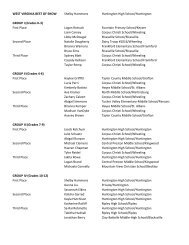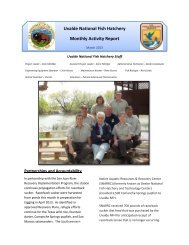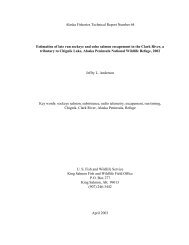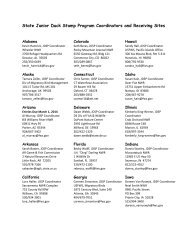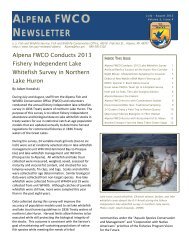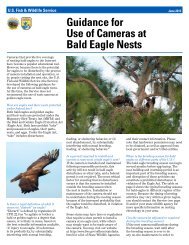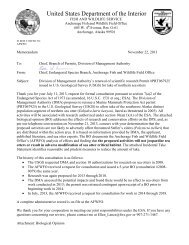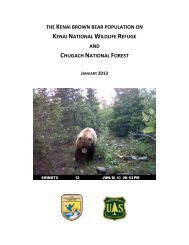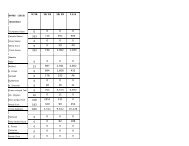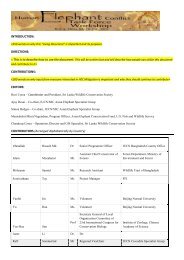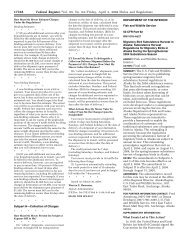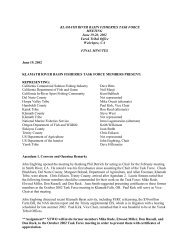- Page 1 and 2:
U.S. Fish & Wildlife Service Hakala
- Page 7 and 8:
Executive Summary Executive Summary
- Page 9 and 10:
Executive Summary Hakalau Forest Na
- Page 11 and 12:
Executive Summary Hakalau Forest Na
- Page 13 and 14:
Executive Summary Hakalau Forest Na
- Page 15 and 16:
Hakalau Forest National Wildlife Re
- Page 17 and 18:
Hakalau Forest National Wildlife Re
- Page 20 and 21:
vi Hakalau Forest National Wildlife
- Page 23 and 24:
Hakalau Forest National Wildlife Re
- Page 25 and 26:
Figure 1-1. Refuge vicinity. Chapte
- Page 27 and 28:
Figure 1-2. HFU location. Chapter 1
- Page 29 and 30:
Figure 1-3. KFU location. Chapter 1
- Page 31 and 32:
Hakalau Forest National Wildlife Re
- Page 33 and 34:
Hakalau Forest National Wildlife Re
- Page 35 and 36:
Hakalau Forest National Wildlife Re
- Page 37 and 38:
Hakalau Forest National Wildlife Re
- Page 39 and 40:
Hakalau Forest National Wildlife Re
- Page 41 and 42:
Hakalau Forest National Wildlife Re
- Page 43 and 44:
Hakalau Forest National Wildlife Re
- Page 45 and 46:
Hakalau Forest National Wildlife Re
- Page 47 and 48:
Hakalau Forest National Wildlife Re
- Page 49 and 50:
Hakalau Forest National Wildlife Re
- Page 51 and 52:
Hakalau Forest National Wildlife Re
- Page 53 and 54:
Hakalau Forest National Wildlife Re
- Page 55 and 56:
Hakalau Forest National Wildlife Re
- Page 57 and 58:
Hakalau Forest National Wildlife Re
- Page 59:
Chapter 2. Refuge Management Direct
- Page 62 and 63:
Hakalau Forest National Wildlife Re
- Page 64 and 65:
Hakalau Forest National Wildlife Re
- Page 66 and 67:
Hakalau Forest National Wildlife Re
- Page 68 and 69:
Hakalau Forest National Wildlife Re
- Page 70 and 71:
Hakalau Forest National Wildlife Re
- Page 72 and 73:
Hakalau Forest National Wildlife Re
- Page 74 and 75:
Hakalau Forest National Wildlife Re
- Page 76 and 77:
Hakalau Forest National Wildlife Re
- Page 78 and 79:
Hakalau Forest National Wildlife Re
- Page 80 and 81:
Hakalau Forest National Wildlife Re
- Page 82 and 83:
Hakalau Forest National Wildlife Re
- Page 84 and 85:
Hakalau Forest National Wildlife Re
- Page 86 and 87:
Hakalau Forest National Wildlife Re
- Page 88 and 89:
Hakalau Forest National Wildlife Re
- Page 90 and 91:
Hakalau Forest National Wildlife Re
- Page 92 and 93:
Hakalau Forest National Wildlife Re
- Page 94 and 95:
Hakalau Forest National Wildlife Re
- Page 96 and 97:
Hakalau Forest National Wildlife Re
- Page 98 and 99:
Hakalau Forest National Wildlife Re
- Page 100 and 101:
Hakalau Forest National Wildlife Re
- Page 102 and 103:
Hakalau Forest National Wildlife Re
- Page 104 and 105:
Hakalau Forest National Wildlife Re
- Page 107 and 108:
Hakalau Forest National Wildlife Re
- Page 109 and 110:
Hakalau Forest National Wildlife Re
- Page 111 and 112:
Hakalau Forest National Wildlife Re
- Page 113 and 114:
Hakalau Forest National Wildlife Re
- Page 115 and 116:
Hakalau Forest National Wildlife Re
- Page 117 and 118:
Hakalau Forest National Wildlife Re
- Page 119 and 120:
3.5.2 Kona Forest Unit Contaminants
- Page 121 and 122:
Hakalau Forest National Wildlife Re
- Page 123 and 124:
Hakalau Forest National Wildlife Re
- Page 125 and 126:
Hakalau Forest National Wildlife Re
- Page 127 and 128:
Hakalau Forest National Wildlife Re
- Page 129 and 130:
Hakalau Forest National Wildlife Re
- Page 131 and 132:
Hakalau Forest National Wildlife Re
- Page 133:
Chapter 4. Refuge Biology and Habit
- Page 136 and 137:
Hakalau Forest National Wildlife Re
- Page 138 and 139:
Species, Species Group, or Habitat
- Page 140 and 141:
Hakalau Forest National Wildlife Re
- Page 142 and 143:
Hakalau Forest National Wildlife Re
- Page 144 and 145:
Grasslands Hakalau Forest National
- Page 146 and 147:
Hakalau Forest National Wildlife Re
- Page 148 and 149:
Hakalau Forest National Wildlife Re
- Page 150 and 151:
Hakalau Forest National Wildlife Re
- Page 152 and 153:
Hakalau Forest National Wildlife Re
- Page 154 and 155:
Figure 4-6. Central windward study
- Page 156 and 157:
Hakalau Forest National Wildlife Re
- Page 158 and 159:
Hakalau Forest National Wildlife Re
- Page 160 and 161:
Hakalau Forest National Wildlife Re
- Page 162 and 163:
Hakalau Forest National Wildlife Re
- Page 164 and 165:
Hakalau Forest National Wildlife Re
- Page 166 and 167:
4.5.1 ‘I‘iwi (Vestiaria coccine
- Page 168 and 169:
Hakalau Forest National Wildlife Re
- Page 170 and 171:
Hakalau Forest National Wildlife Re
- Page 172 and 173:
Hakalau Forest National Wildlife Re
- Page 174 and 175:
Hakalau Forest National Wildlife Re
- Page 176 and 177:
Hakalau Forest National Wildlife Re
- Page 178 and 179:
Hakalau Forest National Wildlife Re
- Page 180 and 181:
Hakalau Forest National Wildlife Re
- Page 182 and 183:
Hakalau Forest National Wildlife Re
- Page 184 and 185:
Hakalau Forest National Wildlife Re
- Page 186 and 187:
Hakalau Forest National Wildlife Re
- Page 188 and 189:
Hakalau Forest National Wildlife Re
- Page 190 and 191:
4.8.5 Mollusks Hakalau Forest Natio
- Page 192 and 193:
Hakalau Forest National Wildlife Re
- Page 194 and 195:
Hakalau Forest National Wildlife Re
- Page 196 and 197:
Hakalau Forest National Wildlife Re
- Page 198 and 199:
Hakalau Forest National Wildlife Re
- Page 200 and 201:
Hakalau Forest National Wildlife Re
- Page 202 and 203:
4.9.13 Phyllostegia velutina Hakala
- Page 204 and 205:
4.9.16 Silene hawaiiensis Hakalau F
- Page 206 and 207:
Scientific Name Hakalau Forest Nati
- Page 208 and 209:
Scientific Name Hakalau Forest Nati
- Page 210 and 211:
Hakalau Forest National Wildlife Re
- Page 212 and 213:
Hakalau Forest National Wildlife Re
- Page 214 and 215:
Hakalau Forest National Wildlife Re
- Page 216 and 217:
Hakalau Forest National Wildlife Re
- Page 218 and 219:
Hakalau Forest National Wildlife Re
- Page 220 and 221:
Hakalau Forest National Wildlife Re
- Page 222 and 223:
Hakalau Forest National Wildlife Re
- Page 224 and 225:
Hakalau Forest National Wildlife Re
- Page 226 and 227:
Horses (Equus caballus caballus) Ha
- Page 228 and 229:
Hakalau Forest National Wildlife Re
- Page 230 and 231:
Hakalau Forest National Wildlife Re
- Page 232 and 233:
Hakalau Forest National Wildlife Re
- Page 234 and 235:
Hakalau Forest National Wildlife Re
- Page 236 and 237:
Hakalau Forest National Wildlife Re
- Page 238 and 239:
Hakalau Forest National Wildlife Re
- Page 240 and 241:
Hakalau Forest National Wildlife Re
- Page 242 and 243:
Hakalau Forest National Wildlife Re
- Page 244 and 245:
Hakalau Forest National Wildlife Re
- Page 246 and 247:
Hakalau Forest National Wildlife Re
- Page 248 and 249:
Hakalau Forest National Wildlife Re
- Page 250 and 251:
Hakalau Forest National Wildlife Re
- Page 252 and 253:
Hakalau Forest National Wildlife Re
- Page 254 and 255:
Hakalau Forest National Wildlife Re
- Page 256 and 257:
Hakalau Forest National Wildlife Re
- Page 258 and 259:
Hakalau Forest National Wildlife Re
- Page 260 and 261:
Hakalau Forest National Wildlife Re
- Page 262 and 263:
Hakalau Forest National Wildlife Re
- Page 264 and 265:
Hakalau Forest National Wildlife Re
- Page 267 and 268:
Chapter 5. Social S an nd Economic
- Page 269 and 270:
Figure 5-2. 5 HFU ad dministrativ v
- Page 271 and 272:
Figure 5-3. 5 KFU ad dministrativ v
- Page 273 and 274:
Hakalau Forest National Wildlife Re
- Page 275 and 276:
Hakalau Forest National Wildlife Re
- Page 277 and 278:
Hakalau Forest National Wildlife Re
- Page 279 and 280:
5.2.3 Camping Hakalau Forest Nation
- Page 281 and 282:
Hakalau Forest National Wildlife Re
- Page 283 and 284:
Hakalau Forest National Wildlife Re
- Page 285 and 286:
Kona Forest Unit Hakalau Forest Nat
- Page 287 and 288:
Hakalau Forest National Wildlife Re
- Page 289 and 290:
Hakalau Forest National Wildlife Re
- Page 291 and 292:
5.3.6 Refuge Contribution Hakalau F
- Page 293 and 294:
Hakalau Forest National Wildlife Re
- Page 295:
Appendices Above: Nēnē/John De Me
- Page 298 and 299:
Critical Habitat Hakalau Forest Nat
- Page 300 and 301:
Critical Habitat Hakalau Forest Nat
- Page 302 and 303:
Hakalau Forest National Wildlife Re
- Page 304 and 305:
Critical Habitat Hakalau Forest Nat
- Page 306 and 307:
Critical Habitat Hakalau Forest Nat
- Page 308 and 309:
Critical Habitat Life Year First Fa
- Page 310 and 311:
Hakalau Forest National Wildlife Re
- Page 312 and 313:
Hakalau Forest National Wildlife Re
- Page 314 and 315:
Hakalau Forest National Wildlife Re
- Page 316 and 317:
Hakalau Forest National Wildlife Re
- Page 318 and 319:
Genus Species Hawaiian/Common Name
- Page 320 and 321:
Genus Species Hawaiian/Common Name
- Page 322 and 323:
3x3 Code Genus Species Syn Status I
- Page 324 and 325:
Hakalau Forest National Wildlife Re
- Page 326 and 327:
Hakalau Forest National Wildlife Re
- Page 328 and 329:
Hakalau Forest National Wildlife Re
- Page 330:
Hakalau Forest National Wildlife Re
- Page 333 and 334:
Hakalau Forest National Wildlife Re
- Page 336 and 337:
Hakalau Forest National Wildlife Re
- Page 338:
Hakalau Forest National Wildlife Re
- Page 341 and 342:
Hakalau Forest National Wildlife Re
- Page 344 and 345:
Hakalau Forest National Wildlife Re
- Page 346 and 347:
Hakalau Forest National Wildlife Re
- Page 348 and 349:
Hakalau Forest National Wildlife Re
- Page 350 and 351:
Hakalau Forest National Wildlife Re
- Page 352 and 353:
Hakalau Forest National Wildlife Re
- Page 355 and 356:
Use: Wildlife Observation and Photo
- Page 357 and 358:
Availability of Resources: Hakalau
- Page 359 and 360:
Wildlife Photography: Hakalau Fores
- Page 361 and 362:
Hakalau Forest National Wildlife Re
- Page 363:
Hakalau Forest National Wildlife Re
- Page 366 and 367:
Hakalau Forest National Wildlife Re
- Page 368 and 369:
Public Review and Comment: Hakalau
- Page 371 and 372:
Hakalau Forest National Wildlife Re
- Page 373 and 374:
Anticipated Impacts of the Use(s):
- Page 375 and 376:
Hakalau Forest National Wildlife Re
- Page 378 and 379:
Hakalau Forest National Wildlife Re
- Page 380 and 381:
� Surveys: Scientific inventory o
- Page 382 and 383:
Hakalau Forest National Wildlife Re
- Page 384 and 385:
Hakalau Forest National Wildlife Re
- Page 386 and 387:
Hakalau Forest National Wildlife Re
- Page 388:
References Cited: Hakalau Forest Na
- Page 391 and 392:
Permits Hakalau Forest National Wil
- Page 393 and 394:
Attachment 2 Study title: Fiscal ye
- Page 395 and 396:
Hakalau Forest National Wildlife Re
- Page 397 and 398:
Hakalau Forest National Wildlife Re
- Page 399 and 400:
Use: University of Hawai‘i Field
- Page 401 and 402:
Hakalau Forest National Wildlife Re
- Page 403 and 404:
Hakalau Forest National Wildlife Re
- Page 405 and 406: Hakalau Forest National Wildlife Re
- Page 407 and 408: Hakalau Forest National Wildlife Re
- Page 409: References Cited: Hakalau Forest Na
- Page 412 and 413: Hakalau Forest National Wildlife Re
- Page 414 and 415: Activity 5-year intervals: 2015, 20
- Page 416 and 417: Hakalau Forest National Wildlife Re
- Page 418 and 419: Activity 5-year intervals: 2015, 20
- Page 420 and 421: Hakalau Forest National Wildlife Re
- Page 422 and 423: Hakalau Forest National Wildlife Re
- Page 424 and 425: Hakalau Forest National Wildlife Re
- Page 426 and 427: Hakalau Forest National Wildlife Re
- Page 428 and 429: Hakalau Forest National Wildlife Re
- Page 430 and 431: Hakalau Forest National Wildlife Re
- Page 432 and 433: Hakalau Forest National Wildlife Re
- Page 434 and 435: Hakalau Forest National Wildlife Re
- Page 436 and 437: Hakalau Forest National Wildlife Re
- Page 438 and 439: Hakalau Forest National Wildlife Re
- Page 440 and 441: Hakalau Forest National Wildlife Re
- Page 442 and 443: Hakalau Forest National Wildlife Re
- Page 444 and 445: Hakalau Forest National Wildlife Re
- Page 446 and 447: Hakalau Forest National Wildlife Re
- Page 448 and 449: Hakalau Forest National Wildlife Re
- Page 450 and 451: Hakalau Forest National Wildlife Re
- Page 452 and 453: Hakalau Forest National Wildlife Re
- Page 454 and 455: Hakalau Forest National Wildlife Re
- Page 458 and 459: Hakalau Forest National Wildlife Re
- Page 460 and 461: Natural Processes (biotic and abiot
- Page 462 and 463: Natural Processes (biotic and abiot
- Page 464 and 465: Natural Processes (biotic and abiot
- Page 466 and 467: Natural Processes (biotic and abiot
- Page 468 and 469: Table 4-2. Resources of Concern. Ot
- Page 470 and 471: Other Benefiting Species Life Histo
- Page 472 and 473: Hakalau Forest National Wildlife Re
- Page 474 and 475: Hakalau Forest National Wildlife Re
- Page 476 and 477: Hakalau Forest National Wildlife Re
- Page 478 and 479: Hakalau Forest National Wildlife Re
- Page 480 and 481: Hakalau Forest National Wildlife Re
- Page 482 and 483: Hakalau Forest National Wildlife Re
- Page 484 and 485: 6.5 Record Keeping 6.5.1 Labels and
- Page 486 and 487: Hakalau Forest National Wildlife Re
- Page 488 and 489: 7.2.1 Environmental exposure Hakala
- Page 490 and 491: Hakalau Forest National Wildlife Re
- Page 492 and 493: Hakalau Forest National Wildlife Re
- Page 494 and 495: 7.2.3 Assumptions for ecological ri
- Page 496 and 497: Hakalau Forest National Wildlife Re
- Page 498 and 499: Hakalau Forest National Wildlife Re
- Page 500 and 501: Hakalau Forest National Wildlife Re
- Page 502 and 503: Hakalau Forest National Wildlife Re
- Page 504 and 505: Hakalau Forest National Wildlife Re
- Page 506 and 507:
Hakalau Forest National Wildlife Re
- Page 508 and 509:
Hakalau Forest National Wildlife Re
- Page 510 and 511:
Hakalau Forest National Wildlife Re
- Page 512 and 513:
Hakalau Forest National Wildlife Re
- Page 514 and 515:
Hakalau Forest National Wildlife Re
- Page 516 and 517:
Hakalau Forest National Wildlife Re
- Page 518 and 519:
Table CP.1 Pesticide Name Trade Nam
- Page 520 and 521:
Hakalau Forest National Wildlife Re
- Page 522 and 523:
Hakalau Forest National Wildlife Re
- Page 524:
Hakalau Forest National Wildlife Re
- Page 527 and 528:
Hakalau Forest National Wildlife Re
- Page 529 and 530:
Hakalau Forest National Wildlife Re
- Page 531 and 532:
Hakalau Forest National Wildlife Re
- Page 533 and 534:
Hakalau Forest National Wildlife Re
- Page 535 and 536:
Hakalau Forest National Wildlife Re
- Page 537 and 538:
Hakalau Forest National Wildlife Re
- Page 539 and 540:
Hakalau Forest National Wildlife Re
- Page 541 and 542:
Hakalau Forest National Wildlife Re
- Page 543 and 544:
Hakalau Forest National Wildlife Re
- Page 545 and 546:
Hakalau Forest National Wildlife Re
- Page 547 and 548:
Hakalau Forest National Wildlife Re
- Page 549 and 550:
Hakalau Forest National Wildlife Re
- Page 551 and 552:
Hakalau Forest National Wildlife Re
- Page 553 and 554:
Hakalau Forest National Wildlife Re
- Page 555 and 556:
Date Acquired Hakalau Forest Nation
- Page 557 and 558:
Hakalau Forest National Wildlife Re
- Page 559:
U.S. Department of the Interior U.S




